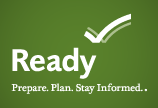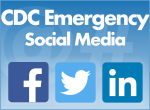Be Prepared for Hurricane Season
PUBLIC SERVICE ANNOUNCEMENT
Script
This podcast is presented by the Centers for Disease Control and Prevention. CDC - safer, healthier people.
There are basic steps you can take to prepare for hurricane season.
- Learn about your community's emergency plans, warning signals, and evacuation routes.
- Know where to find emergency shelters
- Inform local authorities about anyone with special needs, such as the elderly or bedridden, or anyone with a disability. Don’t wait until the hurricane is on its way. Do this now.
- Make plans to ensure your pets' safety. Emergency shelters can not accept pets due to safety and sanitation requirements
- Locate and secure your important papers, such as insurance policies, wills, licenses, and stocks
- Post emergency phone numbers at every phone and program these into your cell phone.
- Make sure you have a battery-powered radio on hand. A NOAA weather radio can be especially helpful for up-to-the minute reports on weather and location-specific storm watches and warnings.
- Be prepared to turn off electrical power and gas in case you are asked to evacuate.
Before hurricane season, stock your home with supplies. At a minimum, these should include:
- Several clean containers for water—enough to hold one gallon of water per person per day for at least three days. This should be enough for drinking and sanitation. You should also have water-purifying supplies on hand, such as chlorine or iodine tablets, or unscented ordinary household chlorine bleach.
- A first aid kit and manual.
- Prescription medicines and special medical supplies.
- Baby food and prepared formula, diapers, and other baby supplies.
- A 3 to 5 day supply of non-perishable food.
- Flashlights and extra batteries.
- Sleeping bags and extra blankets.
- Personal hygiene supplies, such as soap, toothpaste, and sanitary napkins. Baby wipes are useful for the whole family in cases where bathing facilities are not available.
- And an emergency kit for your car with food, flares, booster cables, maps, tools, first aid kit, fire extinguisher, and sleeping bags.
Expect to evacuate and prepare for it. When a hurricane watch is issued, you should:
- Review your emergency plans and supplies, and check to see if any items are missing. Make sure you have supplies in your home and an emergency kit in your car.
- Turn on the radio or television for weather updates.
- Listen for disaster sirens and warning signals.
- Fill sinks and bathtubs with water as an extra supply for washing.
- Fill your car’s gas tank.
- If no vehicle is available, make arrangements with friends or family for transportation.
- Secure any items outside which may cause injury or damage property during high winds—items such as bicycles, grills, propane tanks, lawn furniture, and flower pots. Secure any structurally unstable buildings and tie down loose building materials.
- Cover windows and doors with plywood or boards, and place large strips of masking tape on the windows to reduce the risk of breakage and flying glass.
- Put livestock and family pets in a safe area.
- If possible, put vehicles under cover.
- Adjust the thermostat on refrigerators and freezers to the coolest possible temperature.
- Take only essential items with you.
- Make sure you have an emergency kit in your car.
- If you have time, turn off the gas, electricity, and water.
- Unplug appliances to reduce the likelihood of electrical shock when power is restored.
- Follow the designated evacuation routes and expect heavy traffic.
- Monitor the radio or T.V. for weather conditions.
- Stay indoors until the authorities declare the storm over.
- Even if the weather appears to have calmed—do not go outside. The calm "eye" of the storm can pass quickly, leaving you outside when strong winds resume.
- Stay away from all windows and exterior doors. Take shelter in an interior bathroom or in a basement that will provide protection from high winds and flying debris. Bathtubs can provide shelter, especially if you can cover yourself with plywood or other similar material. These spaces can help assure your safety during a structural collapse.
- Turn off power when there is standing water or fallen power lines.
- Prepare to evacuate to a shelter or to a neighbor's home if your home is damaged, or if you’re instructed to do so by emergency personnel.
- Many hurricane-related injuries are cuts caused by flying glass and debris. Other injuries include bone fractures and puncture wounds from exposed nails, metal, or glass.
CDC wants you to be safe this hurricane season. Get a kit. Make a plan. Be informed.
You can find more information on emergency plans and supply kits at http://emergency.cdc.gov/disasters/hurricanes/.
For the most accurate health information, visit www.cdc.gov or call 1-800-CDC-INFO, 24/7.
- Page last reviewed: June 22, 2012
- Page last updated: June 13, 2014
- Content source:


 ShareCompartir
ShareCompartir

